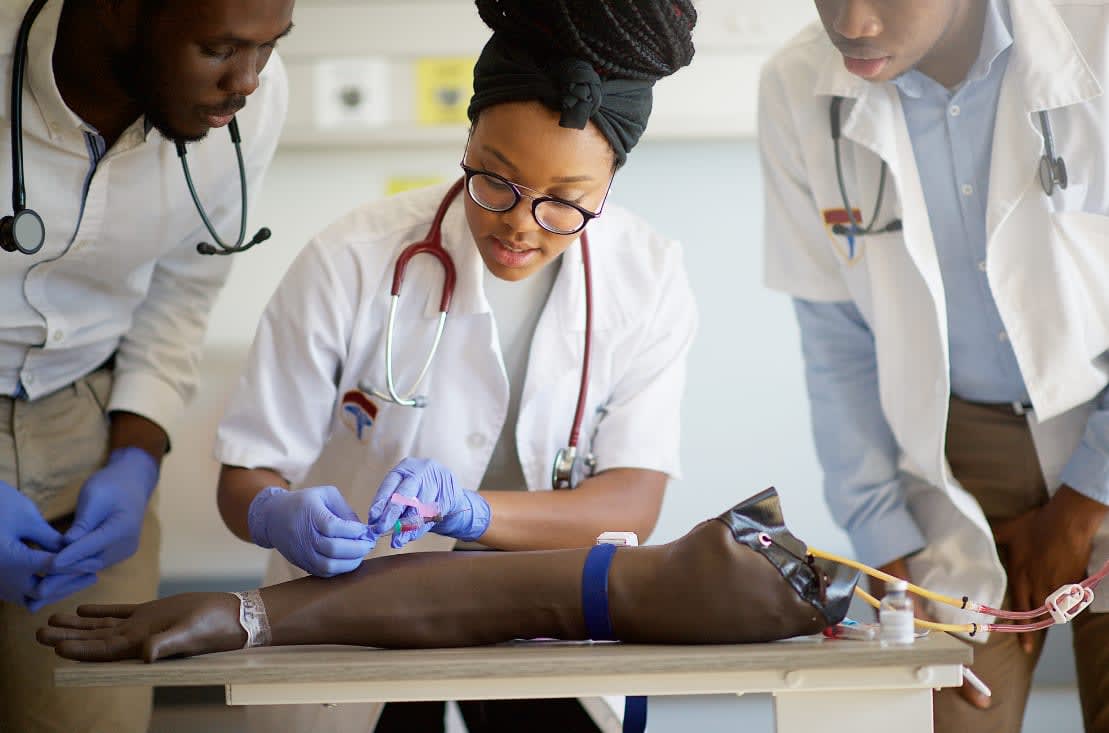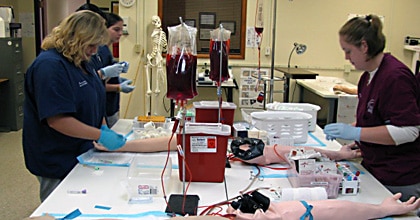Phlebotomy Classes Near Me: Career Impact Breakdown
Phlebotomy Classes Near Me: Career Impact Breakdown
Blog Article
The Path to Qualification: Recognizing the Phlebotomy Training Training Course Journey and Its Relevance
As you consider the path to accreditation in phlebotomy, it is very important to recognize the duty you'll play in medical care. Your training will certainly cover essential abilities, from blood collection strategies to patient communication. Each part of the program prepares you for the difficulties ahead. What specifically does the journey entail, and why is qualification so critical for your future occupation? Let's explore these inquiries additionally.

The Role of Phlebotomists in Medical Care
Phlebotomists play a necessary role in the medical care system, functioning as the important link between people and crucial analysis screening. You'll execute blood draws, ensuring samples are accumulated properly and securely. Your experience aids in diagnosing clinical problems, keeping track of wellness, and directing therapy choices.
In your daily communications, you'll require to establish count on with people, making them feel comfortable during what could be a stressful experience. You're accountable for identifying and taking care of samples carefully to avoid contamination or mistakes, which can influence examination results.
Beyond this, you'll often function along with medical professionals and registered nurses, connecting essential details regarding individuals' conditions. By grasping your skills, you add meaningfully to person treatment, making you a vital part of the medical group.
Introduction of Phlebotomy Training Programs
When checking out phlebotomy training programs, you'll find various kinds created to fit different schedules and finding out styles. Each program helps you create necessary skills like blood collection and patient communication. Comprehending these options is vital to selecting the right course for your profession.
Sorts Of Educating Programs
A number of kinds of training programs are readily available for those aiming to end up being competent in phlebotomy. You can pick from certificate programs, which typically last a couple of months and focus on necessary skills. There are additionally diploma programs that offer an even more extensive education and learning, typically lasting up to a year. If you're trying to find a much deeper understanding, an associate degree in a relevant field may be the appropriate fit. On the internet training courses offer versatility for those stabilizing work or household dedications, allowing you to examine at your very own pace. Furthermore, some health centers and clinics use on-the-job training programs, giving practical experience while you discover. Whatever course you pick, each program aims to furnish you with the required abilities for an effective phlebotomy career.

Key Abilities Established
Grasping phlebotomy needs a collection of essential skills that are established with comprehensive training programs. In addition, communication abilities are fundamental; you'll need to connect with clients, explain procedures, and put them at simplicity. Each of these skills is vital for your success as a qualified phlebotomist, making you a beneficial possession in any type of health care setup.
Secret Parts of a Phlebotomy Training Course
In a phlebotomy training course, you'll focus on crucial subjects that prepared for your future profession. You'll involve in hands-on training that allows you to apply what you've found out in real-world settings. Both the core educational program and sensible experience are essential for your success as a phlebotomist.
Curriculum Overview
While pursuing a phlebotomy training program, you'll run into a core educational program created to equip you with fundamental skills and understanding. Phlebotomy Courses Near Me. This curriculum normally includes anatomy and physiology, concentrating on the blood circulation system and comprehending blood components. You'll also discover various sorts of blood collection approaches, consisting of venipuncture and capillary puncture techniques
In addition, infection control and safety and security procedures are vital elements, guaranteeing you understand how to keep a clean and sterile atmosphere. You'll study patient communication, highlighting communication and empathy, which are vital for alleviating individual stress and anxiety. Lastly, honest and lawful considerations will be addressed, preparing you for real-world obligations. This fundamental knowledge will certainly allow you to succeed as a phlebotomist and provide quality care in clinical settings.
Hands-On Training Experience
Getting hands-on experience is an indispensable component of your phlebotomy training course. This useful training permits you to use what you have actually discovered in a real-world setting, improving your abilities and confidence. You'll practice venipuncture techniques, learn how to deal with various kinds of specimens, and get acquainted with the equipment used in the field. Under the assistance of skilled instructors, you'll fine-tune your skills, guaranteeing you're prepared for any kind of circumstance you could face.
Additionally, you'll get the possibility to interact with people, which is crucial for developing your interaction skills. This combination of technological proficiency and social abilities is vital for your success as a certified phlebotomist. Ultimately, hands-on training is where theory meets technique, strengthening your understanding and preparedness for qualification.
Qualification and Licensing Needs
Before you can start your profession in phlebotomy, it is important to understand the qualification and licensing requirements that differ by state. The majority of states call for phlebotomists to hold an accreditation from a recognized organization, such as the National Phlebotomy Association or the American Culture for Scientific Pathology. These accreditations commonly entail passing a test that checks your expertise and abilities in the area.
Along with certification, some states have particular licensing needs. You may require to finish a certain number of hours in clinical practice, send proof of training, or undertake a history check. It is very important to research your state's regulations to make sure you meet all required requirements.
Remaining informed about these demands not only assists you secure a setting but also boosts your credibility as an expert. By meeting these needs, you'll be well on your way to an effective job in phlebotomy.
Hands-On Training and Practical Experience
Hands-on training and useful experience are necessary components of your phlebotomy education and learning, as they allow you to use theoretical understanding in real-world situations. During your training, you'll participate in supervised venipuncture, learn correct techniques, and end up being knowledgeable about numerous blood collection devices. This straight participation is essential for constructing your self-confidence and sharpening your skills.
You'll work carefully with seasoned specialists that can guide you via the subtleties of individual communication and sample handling. Each session not just enhances your understanding yet likewise prepares you for the fast-paced setting of healthcare settings.
Additionally, several programs incorporate professional turnings, enabling you to experience varied setups, from healthcare facilities to outpatient facilities. This exposure assists you adjust to various difficulties and client needs, ensuring you're well-prepared for your future function. Embrace these opportunities, as they're necessary to coming to be a qualified Phlebotomy Classes Near Me and compassionate phlebotomist.
Obstacles Encountered During Training
While obtaining hands-on experience is necessary, it is very important to recognize the difficulties that can arise during your phlebotomy training. You may encounter anxiety when carrying out treatments on actual individuals, especially if you're new to the setting. The pressure to get everything right can be frustrating. Furthermore, grasping the abilities required for blood attracts takes method; you might deal with technique initially.
Time administration can also be a difficulty, as balancing concept, sensible sessions, and personal dedications can feel challenging. You may face varying discovering rates amongst your peers, resulting in sensations of insecurity if you think you're falling back. Adjusting to the various individualities of trainers can be challenging, as each may have a distinct training style.
Identifying these obstacles early can prepare you for success and assist you establish durability throughout your training trip.
Job Opportunities After Qualification

As you gain experience, you might also take into consideration concentrating on areas like pediatric or geriatric phlebotomy, satisfying certain person requirements. Some phlebotomists pick to progress their professions by becoming laboratory technicians or going after further education and learning in healthcare areas.
Additionally, your qualification can bring about functions in training or overseeing brand-new phlebotomists, enabling you to share your expertise. With the healthcare industry consistently expanding, your skills will certainly always remain in need, leading the way for a steady and meeting job. Welcome the possibilities waiting for you!
Frequently Asked Inquiries
What Is the Common Period of a Phlebotomy Training Program?
Phlebotomy training courses normally last around four to eight weeks. You'll participate in hands-on method, class instruction, and online understanding. Finishing this training prepares you for qualification and a rewarding career in medical care.
Are Online Phlebotomy Courses Available?
Yes, on the internet phlebotomy courses are readily available. They provide versatility and ease, enabling you to examine at your own speed. Just validate the program is approved to satisfy certification needs and obtain beneficial abilities for your profession.
Exactly How Much Does Phlebotomy Training Normally Price?
Phlebotomy training commonly costs in between $700 and $2,500, depending on the program and place. You should consider factors like training course size, included materials, and hands-on experience when selecting the ideal training for you.
What Prevail Requirements for Phlebotomy Training?
Common requirements for phlebotomy training commonly include a high institution diploma or GED, booster shots, and a history check. Some programs may likewise call for basic healthcare expertise or qualifications, ensuring you're prepared for hands-on training.
Can I Function While Finishing My Phlebotomy Training?
Yes, you can work while completing your phlebotomy training. Several students balance tasks with their researches, yet make specific to manage your time effectively to ensure you satisfy both job and training commitments successfully.
Report this page